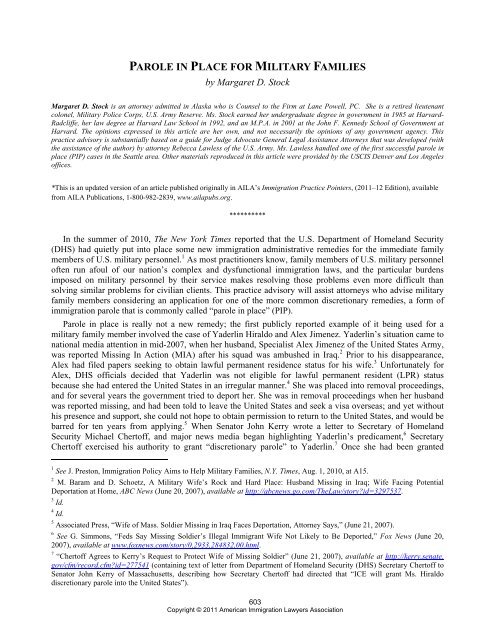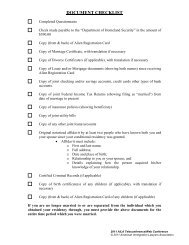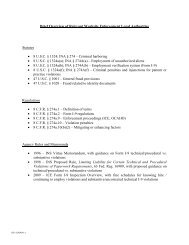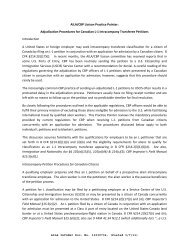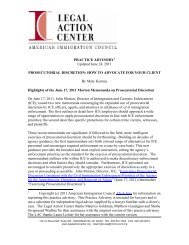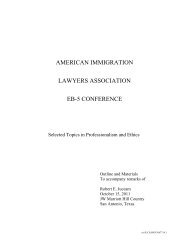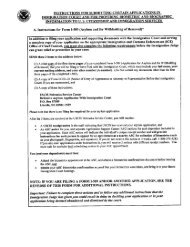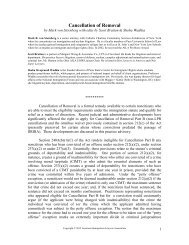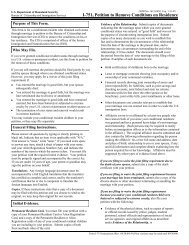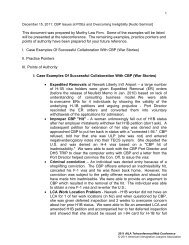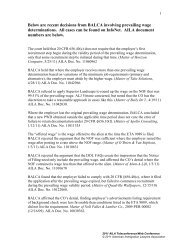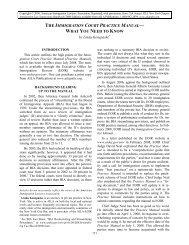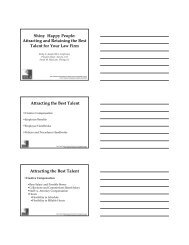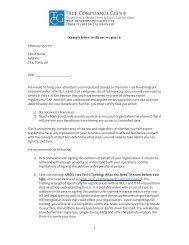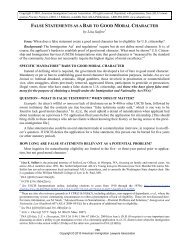Resources for 03-20-12 Seminar - AILA webCLE
Resources for 03-20-12 Seminar - AILA webCLE
Resources for 03-20-12 Seminar - AILA webCLE
You also want an ePaper? Increase the reach of your titles
YUMPU automatically turns print PDFs into web optimized ePapers that Google loves.
606 IMMIGRATION PRACTICE POINTERS, <strong>20</strong>11–<strong>12</strong> ED.member is stationed in a country where the US Status of Forces Agreement requires the spouse to have alawful US immigration status in order to join the US military member in the <strong>for</strong>eign country, then PIP may benecessary be<strong>for</strong>e the spouse can obtain a green card and join his or her military member spouse overseas.A military family member also does not need PIP if the military family member was admitted lawfully buthas no documentation of the entry. Those cases are governed by Matter of Areguillin 22 and Matter ofQuilantan 23 and practitioners do not need PIP to file <strong>for</strong> adjustment in these circumstances.How Do I Request PIP?As of this writing, no <strong>for</strong>mal regulatory guidance on military PIP has been issued by DHS or USCIS.Practitioners report a variety of different approaches at different USCIS offices.In most USCIS field offices, a PIP request consists of a hardship letter signed by the service member andsupporting documentation, which should be submitted to the local USCIS office having jurisdiction over theservice member’s residence or place of duty. An example of the list of requirements from the Los AngelesUSCIS Office is reproduced in the Appendix.Some practitioners report that their particular USCIS field office also requires that a biometrics fee be paidwith the initial request <strong>for</strong> PIP; others report that a Form I-131 is required; and yet others report that a Form I-131 and a fee are required. As of this writing, there is no standardized practice, so practitioners should checkwith the local <strong>AILA</strong> chapter, the <strong>AILA</strong> Military Assistance Program (MAP) listserve, or the local USCIS <strong>for</strong>specifics on how military PIP cases are handled at their location. This practice advisory will also be updatedonline whenever USCIS issues relevant guidance.DO NOT submit a PIP request to the USCIS Humanitarian Parole office in Washington, D.C.; that officeonly handles requests <strong>for</strong> parole <strong>for</strong> persons who are outside the United States, and PIP is a program <strong>for</strong>military family members who are inside the United States.A sample PIP request letter <strong>for</strong> a noncitizen spouse is attached as a general guide. The enclosuresreferenced should be attached with numbered dividers <strong>for</strong> the reader’s convenience. The letter is typicallyaddressed to the director of the local USCIS field office or, if the client has an ongoing case with USCIS, theoffice that has issued the most recent decision regarding the case.The opening paragraph of the hardship letter should state that this is a request <strong>for</strong> a parole in place so thatthe particular military family member can file an Application to Register Permanent Residence or AdjustStatus (I-485) while in the United States. The body of the letter should describe the circumstances that led theservice member to join the armed <strong>for</strong>ces. The letter should then describe the history of the military member’srelationship with the family member seeking PIP; establishing the bona fide nature of the relationship isextremely important, as USCIS is unlikely to grant PIP in any case in which there are indicators of marriagefraud. The family member’s immigration status should be discussed, including the status of any petitions filed<strong>for</strong> the family member, such as an I-130. The conditions of the family member’s home country at the time heor she came to the United States should be discussed. The current conditions may be mentioned if they aresuch that a return to the country would pose a danger to the family member’s health or safety. If applicable,the family member’s loss of Commissary and Post Exchange privileges, military housing, access to militaryfamily member health care, and assistance from the Family Readiness Group may be mentioned. Finally, thehardship the service member would experience if the family member were deported should be described indetail. If the service member or the service member’s children have special needs that make them especiallydependent on the family member <strong>for</strong> support, these needs should be explained and supporting documentationprovided where appropriate. At a minimum, the body of the letter must contain the service member’s name,date of birth, place of birth, rank in military, branch of service, and unit of assignment, as well as the datesand places of birth of the family member and any children. Any upcoming deployments <strong>for</strong> which the servicemember is preparing should be mentioned.22 Matter of Areguillin, 17 I&N Dec. 308 (BIA 1980); see also Matter of Quilantan, 25 I&N Dec. 285 (BIA <strong>20</strong>10).23 Matter of Quilantan, 25 I&N Dec. 285 (BIA <strong>20</strong>10).Copyright © <strong>20</strong>11 American Immigration Lawyers Association
608 IMMIGRATION PRACTICE POINTERS, <strong>20</strong>11–<strong>12</strong> ED.SAMPLE PIP REQUEST LETTERCarl Adams, Field Office DirectorU.S. Department of Homeland Security<strong>12</strong>500 Tukwila International BoulevardSeattle, Washington 98168Dear Mr. Adams:My name is John Doe. I am making a humanitarian parole request on behalf of my wife, Jane Doe. I amasking that she be paroled in place based on her unique status as a military spouse and because of the genuinehardship that I and my children would face if she were removed from the country.My wife Jane came to the United States in <strong>20</strong>04. She entered without inspection. It was out of desperationthat she fled her home country of [name of country] and left her family. This is one of the poorest countries inthe world. Natural disasters have compounded the poverty and crime levels. Her only hope <strong>for</strong> any life at allwas to come to the United States. I have attached as Enclosure 1 a report <strong>for</strong> Congress describing theconditions of her home country near the time she came to the United States <strong>for</strong> your reference. The conditionsthere today remain much the same.I met my wife in <strong>20</strong>04, shortly after she arrived in the United States. We have had two children together,now ages 5 and 3 (See Enclosure 2, Birth Certificates of Child #1 and Child #2). On October 10, <strong>20</strong>08 wemarried. (See Enclosure 4, Marriage Certificate). I joined the military on November 1, <strong>20</strong>08. (See Enclosure3, Military Documentation). I became a U.S. citizen on April 5, <strong>20</strong>09.After I became a U.S. citizen, my wife and I met with a USCIS agent at Joint Base Lewis-McChord toinquire about how Jane could go about applying <strong>for</strong> permanent residence. It was our understanding that shewould be able to adjust status by filing an I-485. In July <strong>20</strong>09, she filed this application, and I also filed an I-130, a Petition <strong>for</strong> Alien Relative, on her behalf. The I-130 was approved on November 25, <strong>20</strong>09. By Noticeof Decision dated March 1, <strong>20</strong>10, we found out that her unlawful entry prevents her from adjusting underINA §245(a) and that she does not otherwise qualify under §245(i). (See Enclosure 5, Notice of Decisiondated March 1, <strong>20</strong>10).It is now our understanding that Jane is not able to adjust status because she entered the United Stateswithout inspection. I have further been told that she can process <strong>for</strong> a visa in her home country, but if shedoes that, she must leave me and the children and travel to [name of country]; her departure from the UnitedStates will trigger a 10 year bar from the United States; I will have to request a waiver of that bar while shewaits in [name of country]; the granting of the waiver is not guaranteed and processing will take manymonths, during which time I will have to find someone to take care of my children so that I can meet mymilitary obligations.I have been told that USCIS sometimes allows spouses of service members to be paroled in place if theirremoval from the country would work a hardship on the service member. I can attest that I would face severehardship if my wife were removed from the country. In <strong>20</strong>09, our youngest child was identified as beingdevelopmentally delayed. He needs extra assistance in the areas of language development and motor skills.(See Enclosure 6, Statement from Pediatrician). As a stay-at-home mother, Jane is this child’s main caregiver.She coordinates all of his therapies and does special exercises with him so that he can overcome thesechallenges.I made the decision to join the military because of the opportunity it presented but also because of my love<strong>for</strong> this country. If my wife leaves me and the children, it will be extremely difficult <strong>for</strong> me to take care of ourchildren on my own. While we do have some family members in the United States, none of them would beable to meet the children’s daily needs. If my wife is not present in the United States, the military will requireme to create a family care plan and to identify other individuals who can take care of the children if militaryduties were to prevent me from doing so. I would not be able to identify anyone as a long-term care provider<strong>for</strong> the children and, thus, I would likely face a discharge from the military <strong>for</strong> lack of a family care plan. (SeeEnclosure 7, Army Regulation 600-<strong>20</strong>(b)(2) and Army Regulation 635-<strong>20</strong>0, para 5–8).Copyright © <strong>20</strong>11 American Immigration Lawyers Association
PAROLE IN PLACE FOR MILITARY FAMILIES 609I’ve attached my Sworn Statement as Enclosure 8 in support of this humanitarian parole request. Inaddition, I have attached my passport as Enclosure 9, my wife’s birth certificate as Enclosure 10, and myproof of citizenship as Enclosure 11. I’ve attached a copy of my wife’s dependent military identification cardas Enclosure <strong>12</strong>.A copy of my wife’s Defense Enrollment Eligibility Reporting System (DEERS) documentation isattached as Enclosure 13, and two passport photos of my wife are attached as Enclosure 14. I will be happy toprovide anything else you need in order to act on this request.My wife’s deadline <strong>for</strong> filing a Motion to Reopen—30 days from the date of the Notice of Decision—isapproaching next week. If it is not possible <strong>for</strong> you to issue a decision on this request by that date, I wouldrespectfully request that the deadline <strong>for</strong> filing a Motion to Reopen be extended.In closing, I thank you <strong>for</strong> considering the hardship to me, a U.S. service member, and to the extent thelaw allows you to do so, the hardship to my wife and children, when issuing a decision on this request. If youwould like to contact me, I may be reached at (555) 555-5555 or <strong>12</strong>34 ABC Street, Tacoma, Washington<strong>12</strong>345.Sincerely,John DoeSergeant, U.S. ArmyEnclosuresCopyright © <strong>20</strong>11 American Immigration Lawyers Association
610 IMMIGRATION PRACTICE POINTERS, <strong>20</strong>11–<strong>12</strong> ED.Copyright © <strong>20</strong>11 American Immigration Lawyers Association
PAROLE IN PLACE FOR MILITARY FAMILIES 611Copyright © <strong>20</strong>11 American Immigration Lawyers Association
FREE SHIPPINGWhen you order by March 30, <strong>20</strong><strong>12</strong>!Gain an understanding of the major issues of immigrationand citizenship laws and their effect on members of the U.S.military and their families.Written by Margaret D. Stock, a <strong>for</strong>mer military academyprofessor and retired officer, and founder of the <strong>AILA</strong> MilitaryAssistance Program, Immigration Law & the Militaryexplores common military-related issues through real caseexamples and provides in<strong>for</strong>mation on special resourcesavailable to military personnel and their family members.Covered topics include:• Selective service and enlistment rules• Special rules and procedures <strong>for</strong> naturalization throughmilitary service• Types of military discharges• Implications of military disciplinary proceedings& courts martial• Parole in Place• Military-related issues <strong>for</strong> family members ofmilitary personnel• Civilian employees/contractors who work alongsidemilitary membersImmigration Law & the Military — the only reliable,up-to-date resource you’ll find on this topic.Immigration Law & theMilitaryMargaret D. Stock$99Special PricingAMERICAN IMMIGRATION LAWYERS ASSOCIATIONFax to: 301-843-0159 or mail completed <strong>for</strong>m with payment to: <strong>AILA</strong>, PO Box 753, Waldorf, MD <strong>20</strong>604-0753o Yes, please ship me _____ copy(ies) of Margaret Stock’s Immigration Law & the Military at $99 eachShip to:___________________________________________________________________________________________________Name:____________________________________________________________________________________________________Address:__________________________________________________________________________________________________City:_______________________________________ State:__________________________________________________________Daytime Phone:________________________________ Fax:___________________________________________________________E-mail____________________________________________________________________________________________________Payment In<strong>for</strong>mation: o Visa o MC o AmExCard No.____________________________________ Exp. Date:_______________________________________________________Print Name on Card:_____________________________ Signature:_______________________________________________________Please mail or fax <strong>for</strong>mor call 1-800-982-2839.Use Code: MLSTK3<strong>AILA</strong> Publications • www.ailapubs.org • pubs@aila.orgWritten ... Edited ... Published by Immigration Lawyers


